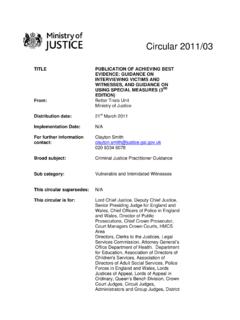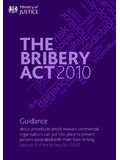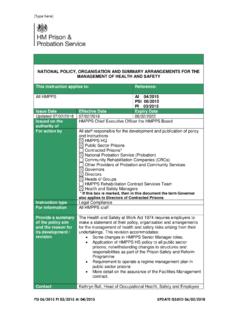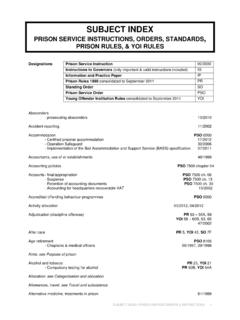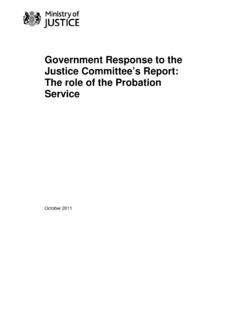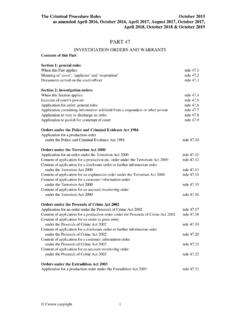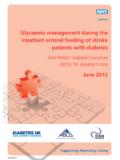Transcription of PLEA AND TRIAL PREPARATION HEARINGS - Justice
1 PTPH INTRODUCTION AND guidance PTPH Introduction and guidance Revised December 2015 - Page 1 of 12 PLEA AND TRIAL PREPARATION HEARINGS Introduction and guidance Revised December 2015 All cases sent to the Crown Court after 5th January 2016 will be sent to a Plea and TRIAL PREPARATION Hearing This Introduction and guidance note has been revised to include the information published by the SPJ s office and draws on the experience of the six early adopter courts. Why the Change? There has been a widely held perception that Preliminary HEARINGS in cases where not guilty pleas are expected have been held too early in the process for the court to give more than perfunctory orders and that Plea and Case Management HEARINGS are either unnecessary or not held at a time when active case management could be most effective.
2 The result has been a multiplicity of HEARINGS . There have also been differing local practices and protocols, and differing methods of recording court orders. The result has been failings of compliance when orders made have not always been communicated clearly to those who must act upon them. The new Plea and TRIAL PREPARATION Hearing (PTPH) and related procedures will provide a single national process to be used in all Crown Courts. It builds on the Transforming Summary Justice initiative in the Magistrates Courts. The PTPH: Takes place a little later in the process than Preliminary HEARINGS , generally 28 days after sending unless, in individual cases, the Resident Judge orders otherwise; Occurs after the prosecution will have provided available information about the case and obtained details of the availability of likely prosecution witnesses.
3 In all but complex cases this should be sufficient to enable the court to case manage effectively without the need for a Further Case Management Hearing (FCMH) before TRIAL . Presumes that the parties will have communicated with each other prior to the PTPH in accordance with the duty of engagement now found in CrimPR 3 and will continue to do so thereafter. PTPH INTRODUCTION AND guidance PTPH Introduction and guidance Revised December 2015 - Page 2 of 12 The overarching aims The overarching aims are: A single national process Robust case management A reduced number of HEARINGS The earlier resolution of pleas and the identification of the issues in the case The maximum participation and engagement by every participant within the system Effective compliance with the Criminal Procedure Rules (CrimPR); Practice and Court Directions.
4 The CrimPR and CrimPD are available to view at: Implementation All cases sent after 5th January 2016 will be sent to a PTPH hearing. The chain of implementation is this. There is a National Implementation Team setting national requirements reflected in this guidance . Each circuit has a Circuit Implementation Team (the South Eastern Circuit has two) and most Crown Courts will need to establish their own Crown Court Implementation Team ( Local LITs) chaired by the Resident Judge as a means to inform court users and respond to their questions and to liaise with the Circuit Implementation Team so as to ensure continuity across the Circuit.
5 The judicial leads for the Circuits Implementation Teams are: London: HHJ Hilliard QC supported by HHJ Kinch QC Midlands: HHJ Dean QC North East: HHJ Collier QC Northern: HHJ Goldstone QC South East: HHJ Holt supported by HHJ Cutts QC Wales: HHJ Rees Western: HHJ Ford QC. National guidance and resources is available for the Circuit Implementation Teams and the Court Implementation teams. Digital Case System Parallel with the introduction of the PTPH is the provision of the Digital Case System (DCS) to all Crown Courts before the end of March 2016. The DCS is already operating in Leeds, Southwark, Portsmouth, Liverpool, and Merthyr Tydfil. Reading, Isleworth and Leicester will commence using DCS in November.
6 When the DCS is fully rolled out there will be no paper files in the Crown Court. The documents relied on in criminal cases such as the indictment, statements, paper exhibits, defence statement, applications and written orders will be uploaded onto the DCS and will be accessible on computers, tablets and even smartphones. Paper copies will continue to be required for unrepresented parties and jurors. Documents will be served when they are uploaded onto the system AND a notification is sent, by e mail, to the other party or parties. PTPH INTRODUCTION AND guidance PTPH Introduction and guidance Revised December 2015 - Page 3 of 12 Thus any paperwork handed over during a hearing will only be deemed to have been filed when it is uploaded onto the DCS.
7 These elements of the new approach are reflected in the new CrimPR More information about DCS may be found At: PTPH and the DCS Therefore some courts will have DCS before 5th January and others will only start DCS after 5th January. Whilst the PTPH and DCS are complementary to each other the key message is that courts do not need to have the DCS up and running to implement BCM or to use the PTPH form effectively. The PTPH does centre around the PTPH form as the primary record of the hearing and the orders made. Arrangements are in hand to put the PTPH form on the DCS so that it can be completed by the parties online. This will be of particular assistance in multi-defendant cases.
8 Those arrangements are not expected to be in place by 5th January so all courts will be starting without that element. The early adopter courts There are six early adopter courts using the PTPH. They are Isleworth; Leicester; Merthyr Tydfil; Portsmouth; Reading and Woolwich. Liverpool and Leeds start soon after. Some started with cases sent from 5th October. Their reports indicate that the system is working. At each court there was effective engagement with the court users and, whilst not everything has gone smoothly at all times, the HEARINGS are constructive and legal representatives have embraced the prospect of reducing the number of pre- TRIAL HEARINGS by making effective use of the PTPH.
9 Early and effective engagement with court users and court staff at all levels seems to be the key to success. Whilst it is too early for a statistical analysis more guilty pleas have occurred than might have been expected at Preliminary HEARINGS . The experiences of the early adopter courts identify problems and will inform decisions on national implementation. The Expedited Case Management Initiative It was recognised that the move to BCM would result in a bulge of work where the two systems overlapped. As a result the CPS has had in place an Expedited Case Management Initiative ( the Blitz ) at all Crown Courts from October to December 2015 to review cases of assault, theft, fraud and drugs to confirm whether or not they should proceed; whether further work is required; and whether they might be resolved by guilty pleas.
10 The duty of engagement The new CrimPR requires the parties to communicate at the first available opportunity, and in any event no later than the beginning of the day of the first hearing, and then thereafter until the conclusion of PTPH INTRODUCTION AND guidance PTPH Introduction and guidance Revised December 2015 - Page 4 of 12 the case. By that communication the parties are required to establish whether the defendant is likely to plead guilty or not guilty, what is agreed and what is likely to be disputed, what information, or other material, is required by on party or another and why; and what is to be done, by whom and when. The parties are required to report on that communication to the court at the first hearing and then thereafter as directed by the court.
